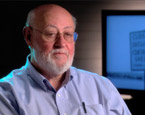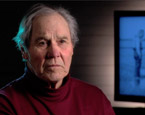1. Oil Spill Pioneers
On Sept. 16, 1969, the barge Florida ran aground off Cape Cod, rupturing its hull and spilling more than 175,000 gallons of No. 2 fuel oil. Winds and waves pushed the oil onto the beaches and marshes of West Falmouth, Mass., on the figurative doorstep of Woods Hole Oceanographic Institution. Marine chemists and biologists who usually worked on basic questions of oceanography applied their expertise and specialized techniques to the problems posed by the spill. In the process, they laid a foundation and a legacy for research on oil spills that were applied decades later to Deepwater Horizon.
The original work on the West Falmouth oil spill by Max Blumer, Howard Sanders, George Hampson, and others was full of firsts. They pioneered the use of chemical techniques to identify and track components of oil from the spill, showed that oil compounds could still be present and toxic even if oil isn’t visible in the water or mud, and demonstrated a clear link between oil compounds and massive die-offs of marine organisms.
Many of those pioneering scientists, their students, and their successors at WHOI continued to work on the sediments and marshes affected by the spill, creating the longest-running study of the long-term fate and effects of petroleum hydrocarbons in a coastal area. WHOI salt marsh ecologist John Teal and graduate student Kathryn Burns continued to study West Falmouth marshes through the mid-1970s, and Teal, biologist John Stegeman, and chemist John Farrington revisited the old spill in 1989. Each time, remnants of the 1969 oil persisted.
Research on oil spills also persisted at WHOI. Farrington worked on many, including the 1979 Ixtoc spill in the western Gulf of Mexico. Ixtoc was the only large, deep-sea oil spill before Deepwater Horizon, and Farrington’s experience there guided present-day WHOI scientists in their work at Deepwater Horizon. On the biological front, WHOI biologists Judith McDowell and John Stegeman instituted studies on the physiological impacts of pollutants on marine life, which continue today.
Like their predecessors, most of the WHOI scientists and engineers who worked on the Deepwater Horizon spill were not “oil spill scientists.” They were ocean scientists whose basic research gave them the skills and experience needed to tackle the crisis.
WHOI researchers in this video (in order of appearance):

John Farrington
Marine biogeochemist
A pioneering scientific expert on oil in the ocean for more than 40 years.

George Hampson
Marine biologist
Studies the effects of oil spills on marine life.

Judith McDowell
Marine biologist
An expert on the physiological impacts of pollutants on marine life.

